Local News
International President and CEO of Bridges for Peace, Rebecca Brimmer, visits Winnipeg
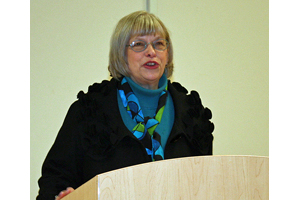
By BERNIE BELLAN Two years ago we ran a press release from Bridges for Peace, in which the organization announced that an interview that I had been planning on doing with BFP International President and CEO Rebecca Brimmer when she was slated to arrive in Winnipeg that April had to be postponed because of – you guessed it: the onset of Covid.
That seems like eons ago, but when I was invited to attend a luncheon at the Asper Campus to hear from Becky (which is what everyone who knows her calls her), along with other representatives of BFP, I was only too glad to do so (although, as I explained to the person who contacted me from BFP: I wanted to be absolutely sure that proper protocols were in place, including safe distancing, also that I would be wearing a mask. I said that I’m still not comfortable being in public places where there are large groups of people, when not everyone is masked.)
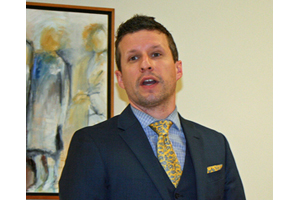
As it was, it was only a very small group of invited guests, representing various Jewish organizations, who were on hand to hear from Becky, also from Peter Fast, Executive Director of BFP Canada (and soon to be CEO of BFP International, taking over from Becky next year). We were also told that we were going to be hearing from one more speaker: Tom Brimmer (Becky’s husband), whom I had the pleasure of meeting – along with Becky, in 2011, when they were both here to attend a function at the Shaarey Zedek honouring then-Executive Director of BFP Canada John Howson, upon his retirement from that position.
Tom Brimmer, by the way, is a licensed tour guide in Israel. I told him that I recalled meeting him back in 2011 when he was wearing a plaid shirt and heavy boots. I told him that he looked like a lumberjack back then. If you take a look at his picture here, I think you’ll agree that he is still not likely to make the cover of GQ.
For those of you not familiar with Bridges for Peace, it’s a Christian organization whose purpose is to foster good relations between Christians and Jews and to provide a range of services for Israeli citizens (of all denominations) who are in need of assistance. Through food banks which it operates in two Israeli cities (Jerusalem and Karmiel), BFP provides over three tons of food a day to over 24,000 Israelis. Now, with the influx of refugees from Ukraine, BFP has stepped up its food donations to meet the needs of many of those refugees, also refugees who have arrived from Ethiopia, Becky explained during her talk. In addition to food banks, BFP volunteers also do home repairs, and help Israelis with medical and dental needs.
During Becky’s talk, she told of her own experiences with BFP in Israel, where she has lived since 1993 (although she and Tom have now moved to Missouri, she told me during lunch, but they both travel back and forth from there to Israel on a regular basis).
Explaining what it is that BFP is attempting to achieve, Becky said the primary purpose is “having a future when Christians and Jews are good friends. There are so many things we share in common.”
While Peter Fast’s role in Canada has been to promote good relations between Jews and Christians, primarily by reaching to members of over 500 churches across Canada, Becky noted, her role in Israel has been “on the other side of the bridge” – reaching out to Jews to demonstrate how supportive so many Christians are of the State of Israel.
By doing so, she continued, “We are doing everything we can to educate the Christian world to undo the damage done in the past. We want to show a different face (to Jews) by acts of kindness.”
While one may have thought that, with the advent of Covid in 2020, donations to BFP and subsequently, support for Israel, might have dried up, just the opposite has happened, Becky observed.
“Christians saw the need to give more,” she stated. In 2022 already, “we’ve raised 50% more than we had budgeted” as a result of the generosity of donors. Becky gave the specific example of BFP in Japan, which has only a very small Christian community. Since the war in Ukraine began, however, and thousands of Ukrainian Jewish refugees have arrived in Israel, over $500,000 has been donated to BFP Japan, she said.
Referring to the Holocaust and how few Christians intervened to help save Jewish lives, Becky noted that many people like to say: “If I had been alive then I would have helped.”
“Well, this is my time to help now,” Becky said. Bridges for Peace “will help as many Jews from Ukraine as we can, also Jews from Ethiopia.”
Since Bridges for Peace officially began (in 1976), it has helped over 100,000 individuals make aliyah to Israel, Becky noted.
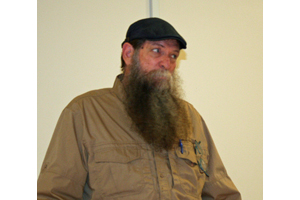
Following Becky’s remarks, her husband Tom took the podium. Tom explained that he wanted to talk about tourism – and how much of a hit Israel has taken to its tourism industry since Covid first emerged worldwide in 2020.
For Tom Brimmer, tourism has given him the opportunity to show Christian tourists what Israel is all about, he said. “Tourism changes people,” he observed.
“Christians come to Israel with every kind of attitude you can imagine,” he said, “but they leave with a changed attitude.”
“The tourism industry,” in Israel, he added however, “has suffered a terrible blow the last two years.”
Yet, while it now appears that tourism is set to make a huge rebound in Israel, as Covid restrictions have been lifted, there is one huge problem, Tom suggested: Almost all the tour guides who lost their jobs as a result of Covid have found other jobs in the meantime. Will they want to leave those new jobs and return to being tour guides? he wondered.
Further, “90 percent of the restaurants that depended on tourists closed,” he added.
Something else Tom noted: Seven hotels were transformed into Covid hotels exclusively. Are they going to revert to normal hotel operations now?
Still, he was optimistic. “We’re going to make a comeback. It’s going to be okay,” he predicted.
As of this moment, “it’s hard to book a tour – they’re in such great demand,” Tom said. On top of that, he said, “we’re training a whole new crop of tour guides, but it does take two years to train a tour guide.”
At that point Tom switched gears and began talking about a Bridges for Peace program with which he’s been heavily involved since it first began in 2006, something called the “Zealous Israel Project.”
How that project began, Tom explained, was with his idea of taking a leaf out of the very successful Birthright program, and bring groups of from 18-30 young Christian adults to Israel for 10-12 days at a time.
In time the project morphed into something quite a bit more comprehensive when it was transformed into an 11-month internship program, based in Jerusalem, with ten different young adults participating at a time. (The mix is usually five males and five females, Tom noted, although it doesn’t always work out that way.)
“We want participants to see the land and experience training sessions with Israelis,” he added. “We teach young Christian adults why Israel is important.”
One of the first graduates of the program was none other than Peter Fast, who has gone on to become Executive Director of Bridges for Peace Canada and, as noted, is about to step into the role of International CEO of BFP.
In his own remarks, Peter Fast paid tribute to two of his predecessors who served as Executive Director of BFP Canada: John Howson, who was Executive Director from 1997-2011 (and who hardly looks much older than when I first met him over 15 years ago) and Eric Malloy, who served in that role until 2019.
Peter said that he and his young family will be moving to Israel in January next year and that he hoped to visit Winnipeg often once he moves into his new position in Israel.
Local News
Vickar Family cuts ribbon on new Tova Vickar and Family Childcare Centre

By MYRON LOVE In the words of Larry Vickar, the Shaarey Zedek’s successful Dor V’ Dor Campaign “is not only a renewal of the synagogue but truly a renewal movement of Jewish life in our community.”An integral part of that renewal movement was the creation of a daycare centre within the expanded synagogue. On Monday, June 23, Larry and Tova Vickar cut the ribbon, thereby officially opening the Tova Vickar and Family Childcare Centre in the presence of 100 of their family members, friends and other supporters of the project.
The short program preceding the morning ribbon-cutting began with a continental breakfast followed by a welcome by both Fanny Levy, Shaarey Zedek’s Board President, and Executive Director Dr. Rena Secter Elbaze. In Elbaze’s remarks, she noted that Larry and Tova wanted their family (including son Stephen and family, who flew in from Florida) and friends at the event to celebrate the opening of the Tova Vickar and Family Childcare Centre, “not because of the accolades, but because, as Larry put it, he hopes that their investment in the congregation will inspire others to do the same.”
“When Larry and I spoke about what this gift meant to him and the message he wanted people to take away,” she continued, “I couldn’t help but connect it to the teachings of Reb Zalman Schachter-Shalomi whose book – Age-ing to Sage-ing – changes the whole way we look at the concept of ageing and basing it on our ancestral teachings.”
She explained that his concept of “Sage-ing” is based on three key ideas – Discover your meaning and purpose; accept our mortality and think about the legacy you want to leave.
“Larry spoke about these exact concepts when we met,” she said.
Elbaze also noted the presence of Shaarey Zedek’s newly-arrived senior Rabbi Carnie Rose, former Rabbi Alan Green, and area MLAs Mike Moroz and Carla Compton.
Larry Vickar expressed his great appreciation for all those in attendance. “Tova and I are deeply moved to stand here with you today for this important milestone in our community”, he said. “We are grateful to be surrounded by all of you, the people we care about, our family and friends… you who have touched our lives and played some part in our journey.”
Local News
New Israeli restaurant opens in River Heights

By BERNIE BELLAN (July 6, 2025) It’s been a long time since our community has been able to welcome the opening of a restaurant that specializes in Israeli food.
That void is now filled with the opening of The Green Falafel, at 1833 Grant (corner of Centennial – next to the Subway), which opened its doors (to huge crowds) on Monday, July 7.
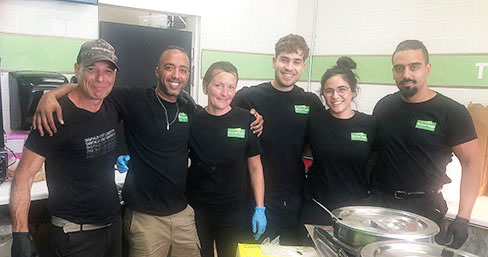
(owners Ariel & Elena Maudi second and third from left)
The restaurant is the fulfillment of a dream long held by the husband and wife team of Ariel and Eden Maudi, who have been living in Winnipeg the past 11 years.
Ariel, who was born in Israel and grew up in Beer Sheva, says that he worked in telecommunications in Ramat Gan for several years. He adds though that he had always dreamed of owning his own falafel stand in Israel, but life was difficult there and he decided to come to Canada as a tourist to see whether there were any opportunities here for him, Eden and their two young children.
Eden, who was born in Russia and moved to Israel with her family in 1996, stayed behind with the two kids, who were both pre-schoolers, while Ariel tested the waters in Canada first.
Ariel says he came to Canada as a tourist in 2013. His first stop was in Toronto, where he acquired his 1st class driver’s license. At the end of 2013 he moved to Winnipeg where he began working as a truck driver. Soon he found himself employed as a successful sales person at Vickar Nissan where, he says, he once achieved the status as the top car sales person in Canada. After working at Vickar Nissan for a number of years, Ariel began working as an installer for Bell MTS.
Meanwhile, Eden began working at a Walmart, later at the Costco on Regent.

But, when the opportunity to move into a space that had been previously occupied by another restaurant, but which had closed, became available, Ariel and Eden decided to open their own Israeli restaurant in an area that hadn’t seen Israeli food served since the controversial closure of Bermax Café in 2019.
The Maudis say that they will be serving a variety of Israeli dishes – all vegetarian, and that they will be fully kosher.
The “green” in Green Falafel, by the way, Ariel Maudi explains, comes from the cilantro and parsley that are added to the chickpeas. In addition, their pitas will be coming from Israel and will be baked fresh daily.
The Green Falafel is open from 10-8 Sunday – Thursday and 10-4 on Friday. (Closed Saturday).Delivery will be available through Uber Eats and DoorDash.
Call 204-557-7837 for information.
Local News
Previews of shows with Jewish performers at this year’s Fringe Festival July 16-27

For show dates and venues go to winnipegfringe.com
By BERNIE BELLAN As has been our custom for many years now we try to find shows that have either Jewish performers or themes that would have particular appeal for Jewish audiences. Many of the Jewish performers at this year’s festival have been here before, but several are new. In no particular order here are blurbs about the shows we’ve found that fit the criteria I’ve just described. (By they way, if we’ve omitted a show that should be included in our list there’s plenty of time to get added to this post. Just drop me a line at jewishp@mymts.net.)

You’ve Been Served: A One-Woman Show About Divorce, Cults, and Coming of Age at Midlife
Noemi Zeigler
You are hereby summoned… to laugh, cry, and maybe belt out a Streisand number in solidarity. You’ve Been Served is a raw and riotous solo comedy by writer-performer Noemi Zeigler. It all begins when Noemi is served divorce papers on top of a garbage bin lid while taking out the trash—an undignified start to a full-blown midlife unraveling.
At 50, still clinging to her dream of becoming a singer, she falls under the spell of a music producer slash self-help guru, joins a spiritual cult, and, instead of landing a record deal, she lands in jail. Behind bars, with help from her long-buried inner child, she begins to reclaim her voice and her power. Turns out, dreams really do come true—just not the way she expected.
The show features vividly drawn characters—including a manipulative cult leader, a toxic ex-husband, and a jail guard named Roach who shares Noemi’s obsession with the fashion of Charlie’s Angels (the ‘70s TV version, of course.)
With salsa dancing, twerking, and a belting rendition of Don’t Rain on My Parade, Zeigler dives into abandonment, reinvention, and self-rescue. As she confronts perimenopause, she discovers it’s not the end—it’s the new puberty. The show touches on grief, sexuality, and spiritual confusion, but Noemi’s childlike optimism asks: What if your breakdown is actually your breakthrough?
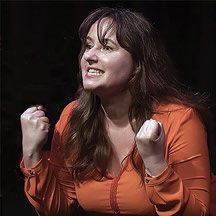
You’re good for nothing… I’ll milk the cow myself
Written & Performed by Natacha Ruck
France, 1981: The first socialist president is about to be elected and young Natacha is ready to implement her own political platform. But first, she has to take down the schoolyard bully,emasculate the rules of French grammar and make off with grandmother’s chocolate.
If you think you know the limits of Jewish mothers, evil grandmothers and transcontinental lovers, meet Natacha Ruck’s family. This true tale of three generations of women, facing three world wars, is equal parts hilarious, shocking and zany.

A One Human Being, Potentially Comedic Performance of Beauty and the Beast NEW WORK!
Written & Performed by Alli Perlov
Be our guest! Local high school drama teacher Alli Perlov is back for a tale as old as time. Can she sing? Not really. Can she act? That’s debatable. Will you laugh? Oh… probably.
Perlov plays dozens of characters, some human, some animal, and many objects, in a comedic exploration of Beauty and the Beast.
In an homage to this brilliant musical adventure, through witty commentary and unstoppable energy, Perlov aims to entertain an audience that isn’t forced to be there like her students.

Hockey Sticks and Beaver Pie
Written & Performed by Melanie Gall
Take a trip around Manitoba. From the 30,000 ft. St. Adolphe snow maze to the Narcisse snake dens! After all, where else holds both the title of Slurpee Capital of the World and the Guinness Record for the most people simultaneously howling like wolves?
Deanna Durbin, Terry Jacks and Burton Cummings are among the many homegrown stars, and Hockey Sticks features their music along with original songs and the stories that make this province unique.
Starring Melanie Gall from past shows Piaf & Brel, Ingenue and Toast to Prohibition
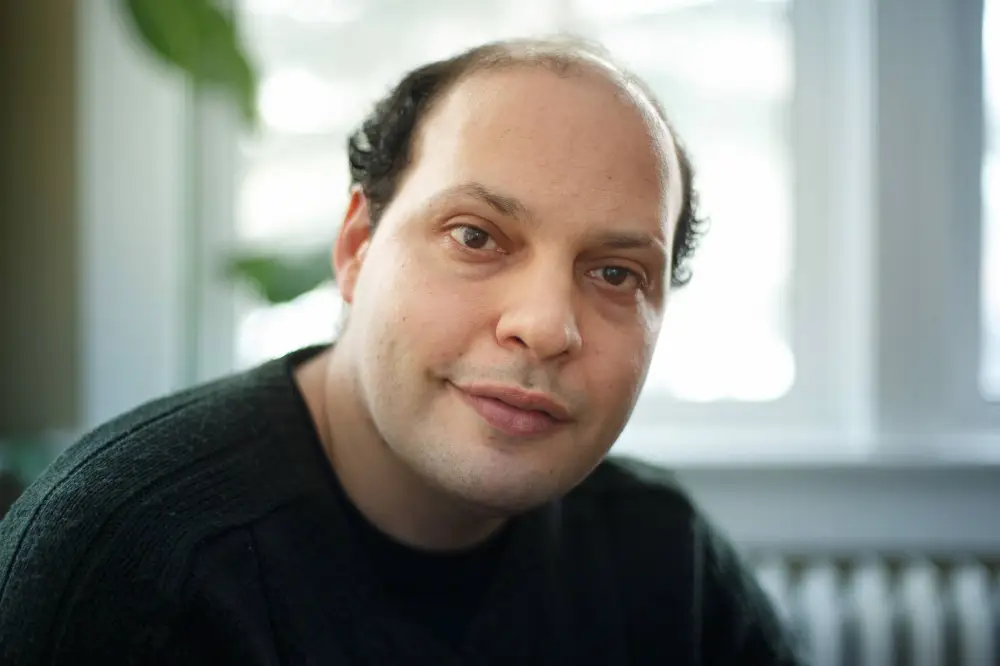
Nerohilarity Exposed
Produced by Adam Schwartz
We all sometimes feel exposed, whether that’s as a fraud or a pretender.
The performers of the award-winning Neurohilarity show, Danielle Kayahara (Laugh Out Loud CBC), Carole Cunningham (Yuk Yuks, The Debaters), Adam Schwartz (Winnipeg Fringe) and Rollin Penner (Yuk Yuks, CBC, Rumors, Winnipeg Comedy Festival), apply a comedic spin to the experiences that make us feel insecure, stripping away the emotional weight with nittygritty jokes and stories that will have you laughing uproariously.
Brilliantly awkward.
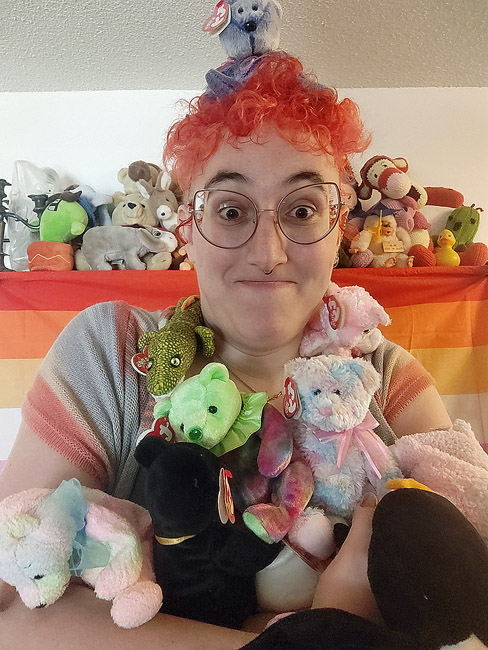
A Lesbian in the Kitchen
Willow Rosenberg
Professional lesbian Willow Rosenberg takes you on a journey through the centuries, superstitions and tablespoons of her lifelong passion for baking in this spiritual successor to 2024’s Jenny Award-nominated A Lesbian in a Bear Store.
Whether you have a favourite spatula, bake once or twice a year, or live in constant fear of being told to “just fold it in”, this one-woman show about family, joy, tradition (but make it gay),
Judaism, comfort, home (but make it gayer*), love, chemistry and magic is for you!
*Who’re we kidding, it’s all gay!

Eleanor’s Story: An American Girl in Hitler’s Germany
Written & Performed by Ingrid Garner
(Ed. note: Although Ingrid Garner isn’t Jewish, we thought the theme of this show might have a special appeal for Jewish readers.)
Based on Eleanor Ramrath Garner’s best-selling memoir, this 16x internationally award-winning adaptation – performed by her granddaughter, Ingrid Garner – details Eleanor’s youth as an American caught in Second World War Berlin.
Punctuated with humour and accompanied by cinematic sound and video, Garner embodies her ancestors in this coming-of-age odyssey, delivering an account of war that is more relevant than ever.

Reviewing The Free Press 2
Benji Rothman
The Winnipeg Free Press has run amok, reviewing each and every Fringe show over the past two decades without consequence or recourse. Now, it’s their turn… again.
In this refurbished work that debuted at last year’s Winnipeg Fringe, Benji Rothman once again takes the Winnipeg Free Press to task. In this (mostly) new, (hopefully) hilarious 45-minute show, Rothman dives deep into their past and exposes their faulty journalism, imbalanced reporting and, of course, embarrassing typos.
